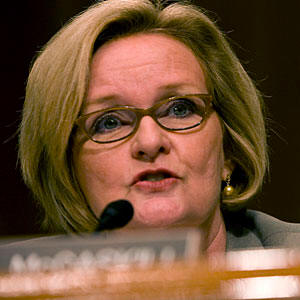|
As
the Federal Aviation Administration (FAA) evaluates the
in-flight use of portable electronic devices (PEDs), I
urge the agency to embrace the expanded use of PEDs and
work to revise the necessary regulations that will allow
for the use of laptop computers, e-readers, smartphones
and other PEDs during the full duration of a flight.
The Aviation Rulemaking Committee (ARC) process that has
been initiated by the FAA is an important step toward
this end. Working with the airlines, electronic device
makers and other stakeholders, I am confident the agency
can craft policies that reflect the increasing use of
these devices by air travelers for professional and
personal uses, while maintaining a commitment to
passenger safety. However, I am concerned by the
longstanding intransigence in reaching workable, common
sense solutions that provide for the expanded use by
airline passengers of electronic devices during the full
duration of a flight.
I
welcome Federal Communications Commission (FCC) Chairman
Genachowski's recent letter in support of expanding
permissible use of electronic devices on flights. The
FAA must now come on board with this common sense
position and enact new policies to memorialize it.
As
you surely know, the public is growing increasingly
skeptical of prohibitions on the use of many electronic
devices during the full duration of a flight, while at
the same time using such devices in increasing numbers.
For example, a traveler can read a paper copy of a
newspaper throughout a flight, but is prohibited from
reading the same newspaper for major portions of the
flight when reading it on an e-reader. The fear of
devices that operate on electricity is dated, at best.
Importantly, such anachronistic policies undermine the
public's confidence in the FAA, thereby increasing the
likelihood that rules of real consequence will be given
too little respect. The absurdity of the current
situation was highlighted when the FAA acted earlier
this year to allow tablet computers to replace paper
flight manuals in the cockpit, further enhancing the
public's skepticism about the current regulations.
While safety and security must be the top priority in
air travel, the FAA and other federal agencies should
also work to ensure air travel is as hassle free as
possible by revising or removing regulations that have
become unnecessary or outdated. It is my hope that the
FAA will work, with the FCC and other federal agencies
where appropriate, as expeditiously as possible to
implement common sense changes to today's restrictive
regulations on in-flight use of PEDs that better reflect
new technologies and the changing role these devices
play in Americans' daily lives. While the agency can and
should use existing authorities to allow for the broader
use of PEDs, I am prepared to pursue legislative
solutions should progress be made too slowly.
|



